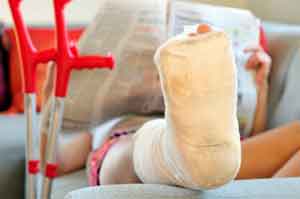When You Get Home
Medicines
If you had to stop taking a daily medicine, ask your surgeon when you can begin taking it again. Make sure you are aware of any possible interactions between your daily medicine and the “temporary” medicine you will be given while you are recovering. If you have any reactions as a result of taking both medicines, call your doctor immediately.
Pain medicine
The “normal” amount of pain you can expect will depend on the type of surgery. What is too much pain depends on how much pain you can stand, your age, and physical condition. Your surgeon will give you medicine for your pain and directions for taking it. If the medicine does not relieve the pain, you should call the surgeon. It is a good idea to take your medicine with food to avoid nausea. The following are side effects of some pain medicines:
• constipation
• upset stomach
• nausea, vomiting
• allergic reaction – rash, itching, hives, trouble breathing
• drowsiness – if medicine is too strong
If your pain is very bad and does not go away after taking the pain medicine, you should call your surgeon. Your family should call your surgeon if your pain medicine makes you so drowsy they cannot wake you.
Antibiotics
Your surgeon may give you antibiotics to prevent infection. If you are given antibiotics, be sure to take them as directed. Feeling better does not mean that all infection-causing bacteria have been destroyed; you must take all of the antibiotic prescribed for you. Common side effects of antibiotics:
• diarrhea
• upset stomach
• vaginal yeast infection
Diet
If at first you are sick at your stomach, you should start with a bland diet of Jell-O, rice, toast, and plenty of fluids. Then slowly increase the kind of foods you eat. To help yoUr body heal, eat nutritious foods and drink plenty of water.
Cal/your surgeon if you still have nausea, vomiting, and/or diarrhea 12 hours after you get home.
Special equipment and home safety
 Before your surgery buy or rent any special equipment your surgeon said you would need, such as crutches, walker, cane, etc. These items will·help you get around by yourself. In addition to having the proper special equipment, you can prevent falls by:
Before your surgery buy or rent any special equipment your surgeon said you would need, such as crutches, walker, cane, etc. These items will·help you get around by yourself. In addition to having the proper special equipment, you can prevent falls by:
• removing electrical or phone cords that lay across floors
• removing or repairing loose rugs or carpet
• cleaning up spills on bare floors
• keeping toys and magazines off of stairs and floors
• watching for pets that may jump on you or run in your path
• wearing shoes with non-skid soles
• taking pain medicine as directed
• keeping ice and mildew off of outside steps and walkways
Incision care
Your incision may have staples or stitches. These will probably be removed within 2 weeks after surgery. As your incision heals, the swelling, soreness, and bruising will improve. It may itch, but try not to scratch! Check your incision everyday for:
• drainage
• redness or swelling
• bright red blood
• opening up
Depending on your surgery you may need to keep your head, arm, hand, foot, or leg elevated. Your doctor may give you instructions for applying compression, heat, or ice. You may have a splint or cast to protect the incision and/or keep you in the correct position for healing.
Activities
It is normal to feel tired or weak after surgery. If possible, have someone stay with you for the first 24 hours. Plan on taking it easy the rest of day following surgery. It is important that you move around a little. Be sure to take deep breaths and cough at least 6 times each hour. Do not plan on strenuous activities fop a few days. You will regain your strength and stamina as you begin doing your normal daily activities. Ask your surgeon when you can:
• go back to work
• drive
• begin walking and exercising regularly
• begin physical therapy if needed
After some types of surgery it is normal to worry about resuming intimate relationships. Many times, though, advice about resuming intimacy is not given. However, by the time you feel like having intimacy again, your recovery should be well along, and you will have nothing to worry about by resuming intimacy. If you do have questions, the best time to ask your surgeon is at your first follow up visit.
When to call your surgeon
Most of the time surgery and recovery go smoothly; therefore, you should be able to take care of most things that happen. However, there are times when you should call your surgeon.
You or your caregiver should call your surgeon if:
• your incision gets infected – it may be red and hot. You will have a temperature over 100.5 ° F. A thick green or yellow fluid may run from the incision and will smell.
• you are very sick at your stomach, especially after taking pain medicine
• your pain is very bad and does not stop after taking pain medicine
• you start having breathing problems or chest congestion
• you have a fever for more than a few days
• you get so drowsy you cannot be awakened
• you have nausea, vomiting or diarrhea for more than 12 hours after you get home Remember to take and record your temperature , every couple off hours for the first few days.
In case of emergency
You or your family should call the surgeon right away if:
• you are bleeding a lot of bright red-blood or you see blood clots
• you have sharp pain that does not go away with pain medicine
• your incision opens
• you had arm or leg surgery and your arm or leg turns blue or you lose feeling in your arm, hand, leg, or foot
• your fever goes up fast or is over 103 °F
• you have an allergic reaction to drugs you are taking
Call 911 and in case of a life-threatening emergency.
Be sure to have handy the phone numbers of the surgical center and your surgeon. You should have an office number and a number to call 24 hours a day including weekends for each.
You are an important member of your health care team!
 Having outpatient surgery means more than being a “patient”. It means being an active member of your health care team. To be a part of that team, you should work together with the doctors, specialists, nurses, and other health care professionals to make sure your surgery and recovery are as safe as possible so you will have the results you expect. To do this means you must learn about and be an active part of the surgical and recovery process. By understanding what will happen before, during, and after your surgery, you will have the confidence to take care of yourself once you are at home and on your own. Your surgery is going to be a success and your recovery rapid ifyou are determined to take charge of your health!
Having outpatient surgery means more than being a “patient”. It means being an active member of your health care team. To be a part of that team, you should work together with the doctors, specialists, nurses, and other health care professionals to make sure your surgery and recovery are as safe as possible so you will have the results you expect. To do this means you must learn about and be an active part of the surgical and recovery process. By understanding what will happen before, during, and after your surgery, you will have the confidence to take care of yourself once you are at home and on your own. Your surgery is going to be a success and your recovery rapid ifyou are determined to take charge of your health!
Important Phone Numbers
Although surgery is very safe today, things can happen. Keep a list of both day-time and 24-hour numbers for the following people:
• Your regular doctor
• Your surgeon
• The surgical center or hospital where you had surgery
• A local ambulance service
• Your pharmacy and a 24-hour pharmacy
• The name and phone number of friend or relative you can call